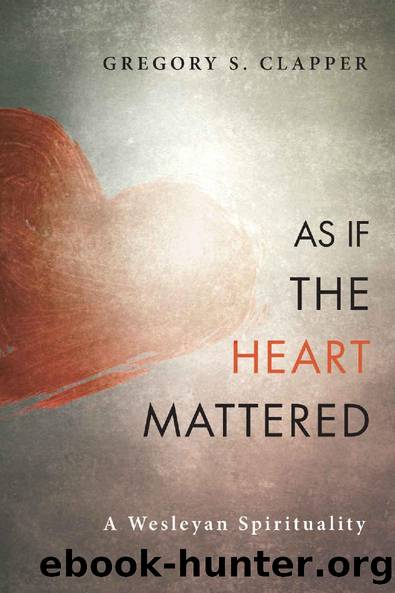As If the Heart Mattered: A Wesleyan Spirituality by Gregory S. Clapper

Author:Gregory S. Clapper [Clapper, Gregory S.]
Language: eng
Format: epub
Tags: Religion, Methodist, Christianity
ISBN: 9781630871475
Publisher: Wipf & Stock, an Imprint of Wipf and Stock Publishers
Published: 2014-04-07T04:00:00+00:00
Notes
1. See his âSalvation by Faith,â sermon 1, 120.
2. Review chapter 1, âJohn Wesleyâs Vision of Heart Religion-Orthokardia.â
3. Sermon 1, 120.
4. Sermon 5, âJustification by Faith,â 189. The scripture reference Wesley gives is Romans 3:25.
5. See âSuggestions for Further Readingâ at the end of the chapter:
Chapter Four
The House of Religion:
The House of Holiness
We have seen that the Christian journey really begins when we have an encounter with holiness that leads us to see that we are not who we should be. This âporchâ of repentance puts us in a position to accept in simple trust the forgiveness that Jesus brought into the worldâto walk through the âdoorâ of faith. We are not who we should be, but God has forgiven us! In this chapter we will try to understand the nature of the life whose center is the mystery of the forgiveness of sin, or to use Wesleyâs image, the house of religion that we enter by crossing over the porch of repentance and passing through the door of faith. This house is âholiness.â In this chapter we want to see just how holiness is brought about in a human life and how it is connected to the âdoorâ of faith. First, though, let us understand how Wesley understood this âholinessâ that is to define our lives as believers.
Holiness as Love
In many places in his writings, John Wesley said that human beings are made for happiness and that the only way to achieve real happiness is to achieve holiness.1 While holiness might seem a daunting or even pretentious goal for human life, Wesley saw it as what scripture required of believers.2 So just what is this holiness that no believer shall attain heaven without? Wesley saw holiness as nothing more or less than love.3 Let us consider several scripture passages that illustrate Wesleyâs belief that the biblical view of the final goal of life is a life of love.
Mark 12:28-34
(Parallels in Matthew 22:34-40 and Luke 10:25-28)
This passage contains the famous âgreat commandment.â Jesus is confronted by a scribe who asks him, âWhich commandment is the first of all?â To this Jesus answers by quoting Deuteronomy 6:4, saying, âHear, 0 Israel: the Lord our God, the Lord is one; you shall love the Lord your God with all your heart, and with all your soul, and with all your mind, and with all your strengthâ (Mark 12: 29-30). Jesus then continues by saying, âThe second is this, âYou shall love your neighbor as yourself.â There is no other commandment greater than theseâ (v. 31).
This last commandment can be found in Leviticus 19:18. In just a few verses of Mark, Jesus quotes two different passages from the Hebrew Scriptures in order to sum up the Jewish law. Moreover, he is boldly addressing this summary to one who would be in a position to correct his viewsâa Jewish scribe. But the scribe does not correct him; instead the scribe says, âYou are right, Teacherâ (v. 32). This dual commandment to love God and love our neighbor, then, is the core of Jewish spirituality.
Download
This site does not store any files on its server. We only index and link to content provided by other sites. Please contact the content providers to delete copyright contents if any and email us, we'll remove relevant links or contents immediately.
What's Done in Darkness by Kayla Perrin(25527)
Shot Through the Heart: DI Grace Fisher 2 by Isabelle Grey(18244)
Shot Through the Heart by Mercy Celeste(18190)
The Fifty Shades Trilogy & Grey by E L James(17798)
The 3rd Cycle of the Betrayed Series Collection: Extremely Controversial Historical Thrillers (Betrayed Series Boxed set) by McCray Carolyn(13212)
The Subtle Art of Not Giving a F*ck by Mark Manson(12945)
Scorched Earth by Nick Kyme(11865)
Stepbrother Stories 2 - 21 Taboo Story Collection (Brother Sister Stepbrother Stepsister Taboo Pseudo Incest Family Virgin Creampie Pregnant Forced Pregnancy Breeding) by Roxi Harding(11097)
Drei Generationen auf dem Jakobsweg by Stein Pia(10241)
Suna by Ziefle Pia(10201)
Scythe by Neal Shusterman(9295)
International Relations from the Global South; Worlds of Difference; First Edition by Arlene B. Tickner & Karen Smith(8652)
Successful Proposal Strategies for Small Businesses: Using Knowledge Management ot Win Govenment, Private Sector, and International Contracts 3rd Edition by Robert Frey(8449)
This is Going to Hurt by Adam Kay(7735)
Dirty Filthy Fix: A Fixed Trilogy Novella by Laurelin Paige(6476)
He Loves Me...KNOT by RC Boldt(5830)
How to Make Love to a Negro Without Getting Tired by Dany LaFerrière(5423)
Interdimensional Brothel by F4U(5330)
Thankful For Her by Alexa Riley(5196)
